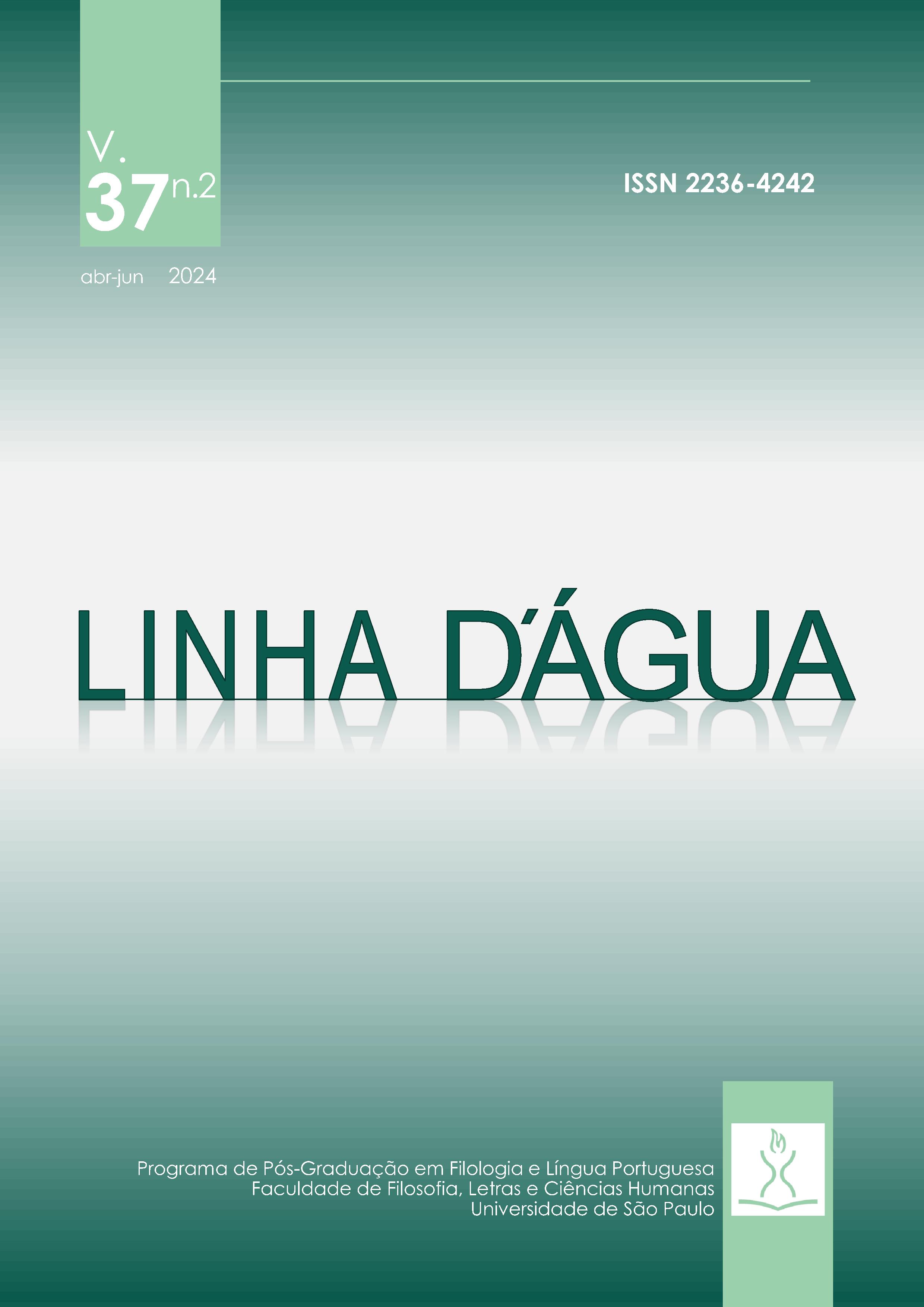Health literacy and language teaching: data-based host language lexicons
DOI:
https://doi.org/10.11606/issn.2236-4242.v37i2p136-160Parole chiave:
Lexicons, Host Language Teaching, Corpus-Based, Health LiteracyAbstract
Using a corpus-based approach, this paper presents methods and results for assessing, extracting, and describing the core vocabulary relevant to healthcare access among migrant populations. The aim is to bridge the gap between the basic information conveyed to people arriving in Portugal and the materials as well as other lexicographic resources used in language teaching. The work includes identifying available resources and/or sources for compiling the relevant dataset for healthcare access; selecting available tools for corpus inquiry; testing and comparing results from different functionalities and different lexical statistics measures available in the tools; manual filtering of the data; and analyzing the results and the extracted lexicon. The obtained results reflect the organization of the extracted lexicon in subdomains, the organization of the items within each subdomain, the relationship with common vocabulary, and the extraction of authentic examples from the corpus.
Downloads
Riferimenti bibliografici
AMARO, R.; CORREIA, S.; GONÇALVES, M.; BARBERO, C.; MAGALHÃES, M. Inclusive Host Language Teaching: Official Texts for Migrant and Refugee People. In: MELETIADOU, E. (Ed.) Policies and Practices for Assessing Inclusive Teaching and Learning. United Kingdom: IGI Global, 2022, p. 183-210. DOI: https://doi.org/10.4018/978-1-7998-8579-5.ch009.
AMARO, R.; CORREIA, S.; GONÇALVES, M. MIGRANTE.PT. 2021. Lisboa: CLUNL-NOVA FCSH, 2021. Available at: https://clunl.fcsh.unl.pt/recursos-em-linha/corpora/migrante-pt/. DOI: https://doi.org/10.34619/ctho-dqqk.
BACELAR DO NASCIMENTO, M. F.; RIVENC, P.; SEGURA DA CRUZ, M. L. Português Fundamental, Vocabulário e Gramática, tomo 1, Vocabulário. Lisboa: INIC, 1984.
BARBERO, C.; AMARO, R. Exploração de corpora para extração e descrição de léxico de especialidade. Linha d’Água, v. 33, n. 1, p. 69-104, 2020. DOI: http://dx.doi.org/10.11606/issn.2236-4242.v33i1p69-104.
BELOSO, B. S. Designing, Describing and Compiling a Corpus of English for Architecture. Procedia – Social Behaviour Sciences, v. 198, p. 459-464, 2015. DOI: https://doi.org/10.1016/j.sbspro.2015.07.466.
BRYERS, D.; WINSTANLEY, B.; COOKE, M. The power of discussion. In: MALLOWS, D. (Ed.) Language issues in migration and integration: perspectives from teachers and learners. London: British Council, 2014, p. 35-54.
CARLINER, G. Wage differences by language group and the market for language skills in Canada. The Journal of Human Resources, v. 16, n. 3, p. 384-399, 1981. DOI: https://doi.org/10.2307/145627.
COE - Council of Europe, Guide to Health Literacy. Contributing to Trust Building and Equitable Access to Healthcare. Steering Committee for Human Rights in the fields of Biomedicine, 2023. Available at: https://www.coe.int/en/web/bioethics/guide-to-health-literacy.
COE - Counsel of Europe, From Linguistic Diversity to Plurilingual Education: Guide for the Development of Language Education Policies in Europe. Language Policy Division Council of Europe, Strasbourg, 2007. Available at: https://rm.coe.int/16802fc1c4.
COE – Council of Europe. Employment and Social Developments in Europe 2018. Publications Office of the European Union. 2018.
COOKE, M.; ROBERTS, C. Developing adult teaching and learning: practitioner guides: ESOL. London: NIACE/NRDC, 2007.
COWIE, A. P. Phraseology. In: ASHER, R. E. (Ed.) Encyclopedia of Language and Linguistics. Oxford: Pergamon, 1994, p. 3168-3171.
COWIE, A. P. Speech formulae in English: Problems of analysis and dictionary treatment. In: VAN DER MEER, G.; TER MEULEN, A. G. B. (Eds.). Making Senses: From Lexeme to Discourse Honour of Werner Abraham. Groningen: Center for language and Cognition, 2001, p. 1–12.
CROSSLEY, S.; SALSBURY, T.; MCNAMARA, D. Measuring L2 lexical growth using hypernymic relationships. Language Learning, v. 59, n. 2, p. 307-334, 2009. DOI: https://doi.org/10.1111/j.1467-9922.2009.00508.x.
DAVIS, T. C.; WOLF, M. S.; BASS, P. F.; THOMPSON, J. A.; TILSON, H. H.; NEUBERGER, M.; PARKER, R. M. Literacy and misunderstanding prescription drug labels. Annals of Internal Medicine, v. 19, p. 887-894, 2006.
DOTTRENS, R.; MASSARENTI, D. Vocabulaire fondamental du français. Neuchâtel: Delachaux et Niestlé, 1948.
DROUIN, P. Term extraction using non-technical corpora as a point of leverage. Terminology. International Journal of Theoretical and Applied Issues in Specialized Communication, v. 1, n. 9, p. 99-115, 2003.
EC – European Commission. Action plan on Integration and Inclusion 2021-2027. 2020. Available at: https://ec.europa.
EGUCHI, M.; KYLE, K. Continuing to explore the multidimensional nature of lexical sophistication: the case of oral proficiency interviews. The Modern Language Journal, v. 104, p. 381-400, 2020. DOI: https://doi.org/10.1111/modl.12637.
ELSOD, A.; MARQUES, M. (Coord.). Ask the People: a consultation of migrants and refugees. EMAB, Open Society Foundations, 2019. Available at: https://www.urbanagenda.urban-initiative.eu/sites/default/files/migration_files/ask_the_people_european_migrant_advisory_board_report_final.pdf.
ERS - Entidade Reguladora da Saúde. Direitos e Deveres dos Utentes dos Serviços de Saúde. Entidade Reguladora da Saúde, 2023. Available at: https://www.ers.pt/media/sfbd4x2h/publica%C3%A7%C3%A3o-ers_direitos-e-deveres.pdf.
FELLBAUM, C. (Ed.). WordNet. An Electronic Lexical Database, MA: The MIT Press, 1998.
FONSECA, A.; SADAT, F.; LAREAU, F. Combining Dependency Parsing and a Lexical Network Based on Lexical Functions for the Identification of Collocations. Computational and Corpus-Based Phraseology, v. 10596, p. 447-461, 2017. DOI: https://doi.org/10.1007/978-3-319-69805-2_31.
GOUGENHEIM, G.; MICHEA, R.; RIVENC, P.; SAUVAGEOT, A. L’élaboration du français élémentaire: étude sur l’établissement d'un vocabulaire et d’une grammaire de base. Paris: Didier, 1954.
HAASTRUP, K.; HENRIKSEN, B. Vocabulary acquisition: Acquiring depth of knowledge through network building. International Journal of Applied Linguistics, v. 10, n. 2, p. 221-240, 2000. DOI: https://doi.org/10.1111/j.1473-4192.2000.tb00149.x.
JAEGER, F. N.; PELLAUD, N.; LAVILLE, B.; KLAUSER, P. The migration-related language barrier and professional interpreter use in primary health care in Switzerland. BMC Health Services Research, v. 19, n. 1, p. 1-10, 2019. DOI: https://doi.org/10.118612913-019-4164-4 PMID:31248420.
KILGARRIFF, A.; BAISA, V.; BUŠTA, J.; JAKUBÍČEK, M.; KOVÁŘ, V.; MICHELFEIT, J.; RYCHLÝ, P.; SUCHOMEL, V. The Sketch Engine: ten years on. Lexicography, v. 1, p. 7-36, 2014a.
KILGARRIFF, A.; JAKUBÍČEK, M.; KOVÁŘ, V.; RYCHLÝ P.; SUCHOMEL, V. Finding Terms in Corpora for Many Languages with the Sketch Engine. Proceedings of the Demonstrations at the 14th Conference the European Chapter of the Association for Computational Linguistics, Sweden, p. 53-56, 2014b.
KILGARRIFF, A.; RYCHLÝ, P.; JAKUBÍČEK, M.; KOVÁŘ, V.; BAISA, V.; KOCINCOVÁ, L. Extrinsic Corpus Evaluation with a Collocation Dictionary Task. In: CALZOLARI, N.; CHOUKRI, K.; DECLERCK, T.; LOFTSSON, H.; MAEGAARD, B.; MARIANI, J.; MORENO, A.; ODIJK, J.; PIPERIDIS, S. Proceedings of the Ninth International Conference on Language Resources and Evaluation (LREC’14). Reykjavik, p. 545–552, 2014c. Available at: http://www.lrec-conf.org/proceedings/lrec2014/pdf/52_Paper.pdf.
KILGARRIFF, A.; HUSÁK, M.; MCADAM, K.; RUNDELL, M.; RYCHLÝ, P. GDEX: Automatically finding good dictionary examples in a corpus. Proceedings of the 13th EURALEX International Congress, Spain, p. 425-432, 2008.
KILGARRIFF, A.; RYCHLÝ, P.; SMRŽ, P.; TUGWELL, D. The Sketch Engine. Proceedings of the 11th EURALEX International Congress, p. 105-116, 2004.
LANG, C.; SCHNEIDER, R.; SUCHOWOLEC, K. Extracting Specialized Terminology from Linguistic Corpora. In: FUß, E.; KONOPKA, M.; TRAWIŃSKI, B.; WAßNER, U. (Eds.). Grammar and Corpora 2016. Heidelberg: Heidelberg University Publishing, 2018, p. 425-434. DOI: https://doi.org/10.17885/heiup.361.509.
LINDEMANN, D. Bilingual Lexicography and Corpus Methods. The Example of German-Basque as Language Pair. Procedia - Social and Behavioral Sciences, v. 95, p. 249-257, 2013. DOI: https://doi.org/10.1016/j.sbspro.2013.10.645.
LÓPEZ MORALES, H. La enseñanza de la lengua materna. Lingüística para maestros de español. Madrid: Playor, 1986.
MARRAFA, P. The Portuguese WordNet: General Architecture and Semantic Internal Relations. DELTA, 2002.
MCMANUS, W.; GOULD, W.; WELCH, F. Earnings of Hispanic men: The role of English language proficiency. Journal of Labor Economics, v. 1, n. 2, p. 101-130, 1983. DOI: https://doi.org/10.1086/298006.
MEL’ČUK, I. Collocations and lexical functions. Phraseology. In: COWIE, A. P. (Ed.) Theory, Analysis, and Applications. Oxford: Oxford University Press, 1998, p. 23-53.
MILLER, G. Nouns in WordNet: a lexical inheritance system. International Journal of Lexicography, v. 3, n. 4, p. 245-264, 1990.
NUTBEAM D. The evolving concept of health literacy. Social Science & Medicine, v. 67, n. 12, p. 2072-2078, 2008. DOI: https://doi.org/10.1016/j.socscimed.2008.09.050.
OIM - Organização Internacional para as Migrações. Glossário sobre Migração, OIM Organização Internacional para as Migrações, 2009. Available at: https://publications.iom.int/system/files/pdf/iml22.pdf.
PEREZ, M. J. M.; RIZZO, C. R. Assessing four automatic term recognition methods: Are they domain- dependent? English for Specific Purposes World, v. 42, n. 15, 2014.
SAG, I.; BALDWIN, T.; BOND, F.; COPESTAKE, A.; FLICKINGER, D. Multiword Expressions: A Pain in the Neck for NLP. In: GELBUKH, A. (Ed). Computational Linguistics and Intelligent Text Processing. Berlin, Heidelberg: Springer, 2002, p. 1–15.
SINCLAIR, J. Corpus, Concordance, Collocation. Oxford: Oxford University Press, 1991
SCHÄFER, R.; BILDHAUER, F. Web Corpus Construction. Switzerland: Morgan & Claypool Publishers, 2013.
STRANDQVIST, W.; SANTINI, M.; LIND, L.; JONSSON, A. Towards a quality assessment of web corpora for language technology applications. In: READ, T.; MONTANER, S.; SEDANO, B. (Ed.). Technological Innovation for Specialized Linguistic Domains: Languages for Digital Lives and Cultures. Belgium: Éditions universitaires européennes, 2018, p. 137-150.
TOGNINI-BONELLI, E. Corpus Linguistics at Work. Amsterdam: John Benjamins, 2001.
U.S DEPARTMENT of Health and Human Services, Office of Disease Prevention and Health Promotion. Healthy People 2030. Available at: https://health.gov/healthypeople.
VAN DER HEIDE, I.; WANG, J.; DROOMERS, M.; SPREEUWENBERG, P.; RADEMAKERS, J.; UITERS, E. The relationship between health, education, and health literacy: results from the Dutch Adult Literacy and Life Skills Survey. Journal of health communication, v. 18, n. 1, p. 172-184, 2013. DOI: https://doi.org/10.1080/10810730.2013.825668.
VOSSEN, P. (Ed.) EuroWordNet General Document. University of Amsterdam, 2002. Available at: http://www.vossen.info/docs/2002/EWNGeneral.pdf.
Dowloads
Pubblicato
Fascicolo
Sezione
Licenza
Copyright (c) 2024 Raquel Amaro

Questo volume è pubblicato con la licenza Creative Commons Attribuzione - Non commerciale 4.0 Internazionale.
A aprovação dos manuscritos implica cessão imediata e sem ônus dos direitos de publicação para a Linha D'Água. Os direitos autorais dos artigos publicados pertencem à instituição a qual a revista encontra-se vinculada. Em relação à disponibilidade dos conteúdos, a Linha D'Água adota a Licença Creative Commons, CC BY-NC Atribuição não comercial. Com essa licença é permitido acessar, baixar (download), copiar, imprimir, compartilhar, reutilizar e distribuir os artigos, desde que para uso não comercial e com a citação da fonte, conferindo os devidos créditos autorais à revista.
Nesses casos, em conformidade com a política de acesso livre e universal aos conteúdos, nenhuma permissão é necessária por parte dos autores ou do Editor. Em quaisquer outras situações a reprodução total ou parcial dos artigos da Linha D'Água em outras publicações, por quaisquer meios, para quaisquer outros fins que sejam natureza comercial, está condicionada à autorização por escrito do Editor.
Reproduções parciais de artigos (resumo, abstract, resumen, partes do texto que excedam 500 palavras, tabelas, figuras e outras ilustrações) requerem permissão por escrito dos detentores dos direitos autorais.
Reprodução parcial de outras publicações
Citações com mais de 500 palavras, reprodução de uma ou mais figuras, tabelas ou outras ilustrações devem ter permissão escrita do detentor dos direitos autorais do trabalho original para a reprodução especificada na revista Linha D'Água. A permissão deve ser endereçada ao autor do manuscrito submetido. Os direitos obtidos secundariamente não serão repassados em nenhuma circunstância.
Come citare
##plugins.generic.funding.fundingData##
-
Fundação para a Ciência e a Tecnologia
##plugins.generic.funding.funderGrants## 10.54499/UIDB/03213/2020;10.54499/UIDP/03213/2020











